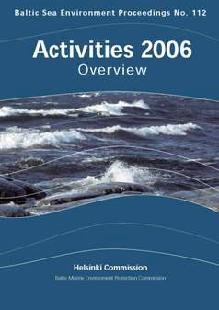Press release
HELCOM releases Annual Report on 2006 activities
 Helsinki, 19 June (HELCOM Information Service) – The Baltic Marine Environment Protection Commission (HELCOM) today released its annual report on 2006 activities.
Helsinki, 19 June (HELCOM Information Service) – The Baltic Marine Environment Protection Commission (HELCOM) today released its annual report on 2006 activities.
The report summarises the activities of HELCOM related to the protection of the Baltic marine environment over the period March 2006 to March 2007. It provides an overview of HELCOM’s assessments of current trends in the Baltic marine environment, as well as details recent HELCOM activities aimed at reducing pollution to the Baltic Sea, improving safety of navigation, as well as halting the decline in biodiversity.
“2006 has been a watershed year in HELCOM’s efforts to restore the health of the Baltic Sea. The Commission began drafting an ambitious Baltic Sea Action Plan to dramatically reduce pollution and reverse the degradation of the marine environment,” says Anne Christine Brusendorff, HELCOM’s Executive Secretary.
The plan’s ultimate objective is to obtain a good ecological status for the Baltic Sea – a sea with diverse biological components functioning in balance and supporting a wide-range of sustainable human economic and social activities. The underlying principle behind the action plan is the ecosystem approach, which was defined in the 1992 Rio Declaration and reiterated at the 2002 World Summit on Sustainable Development in Johannesburg.
In March 2006, HELCOM presented the concept of the action plan to major stakeholders, and also approved the first core elements of a new environmental strategy to restore the Baltic Sea - a common vision of a healthy sea, and a set of Ecological Objectives to work towards so as to fulfill this vision. HELCOM has subsequently been defining a comprehensive set of actions to achieve the agreed goal of a Baltic Sea unaffected by eutrophication, undisturbed by hazardous substances, with favourable biodiversity and environmentally friendly maritime activities.
“I am happy to report that the initial work on the outline of the HELCOM Baltic Sea Action Plan has now been completed,” says Brusendorff. “Following many months of hard work, including a long series of meetings and consultations, the first draft of a set of actions to be included in the Baltic Sea Action Plan was unveiled in March 2007, at the 2nd Stakeholder Conference on the development of the new HELCOM environmental strategy, where the proposals received overwhelming support and the backing of major international organisations”.
HELCOM has now commenced the final stage in the development of the HELCOM Baltic Sea Action Plan. After a series of meetings to work out the details, the new environmental strategy will be adopted at the HELCOM Ministerial Meeting scheduled to take place on 15 November 2007 in Krakow, Poland.
“The adoption of the ambitious but realistic Action Plan will be a critical landmark in our combined efforts to rescue the troubled Baltic Sea. There is still a lot left to do to finalise the plan by the Krakow Ministerial Meeting, but we are very committed and confident that in the end HELCOM will succeed in designing a pragmatic environmental policy with an effective set of measures that will ultimately make the Baltic Sea a more environmentally sound and healthier place,” says Brusendorff. “As the main environmental policy maker in the Baltic Sea region, HELCOM will make sure that the new strategy we are developing today will become a locomotive of regional environmental protection with common objectives, common actions, common obligations, and, of course, common responsibility.”
HELCOM’s innovative work to draw up an environmental strategy, based on a specially defined set of Ecological Objectives, has already been widely backed by the European Union, CBSS and other regional and international organisations, and highlighted as a model to be followed by the rest of the regional sea conventions. Having started the elaboration of the Baltic Sea Action Plan already, HELCOM is ahead of the proposed EU Marine Strategy Directive in terms of applying the ecosystem approach. The new HELCOM plan has been also recognised as a frontrunner within the framework of this Directive, which foresees a regional approach to the protection of the marine environment across European Seas through the development of separate action plans for each marine convention around the continent.
The HELCOM action plan will also take into account the environmental provisions of the Maritime Doctrine of the Russian Federation, which is the only HELCOM country outside the EU. The plan will also be instrumental to the implementation of the renewed Northern Dimension policy, the Baltic Sea regional aspects of the EU-Russian Environmental Dialogue, and the Nordic Environmental Action Plan.
Follow-up: Click here to view the annual report.
To order your print copy, please call the HELCOM Secretariat: + 358 (0)207 412 649 or send an e-mail to info@helcom.fi.
Note to Editors:
The Baltic Marine Environment Protection Commission, more usually known as the Helsinki Commission, or HELCOM, is an intergovernmental organisation of all the nine Baltic Sea countries and the EU which works to protect the marine environment of the Baltic Sea from all sources of pollution.
HELCOM is the governing body of the "Convention on the Protection of the Marine Environment of the Baltic Sea Area," known as the Helsinki Convention.
For more information, please contact:
HELCOM Secretariat
Mr Nikolay Vlasov
Information Secretary
Tel: +358 (0)207 412 635
Fax: +358 (0)207 412 639
E-mail: nikolay.vlasov@helcom.fi

